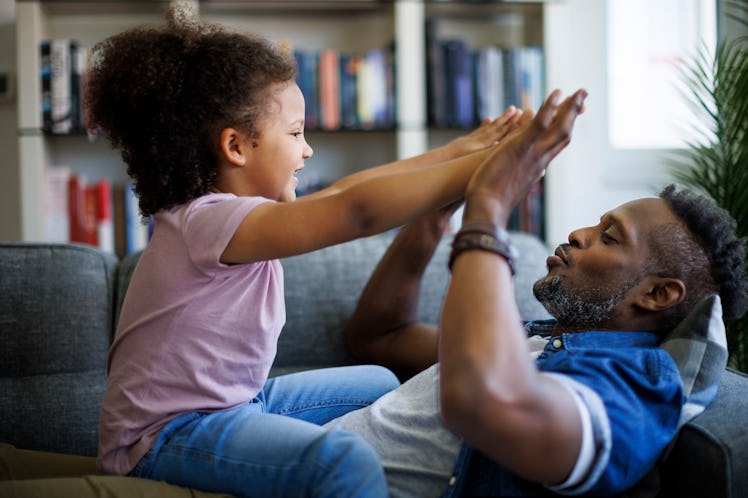If You’re Not Doing Guided Play With Your Kids, They’re Missing Out
A new study finds parents are aware of the importance of play, but need to learn about the power of playful learning.

In the adult world, play and productivity are rarely grouped together. It’s not often we hear someone describe going to work or doing chores as fun. But for those in the parenting world, play is everything. A new study published in the journal Frontiers in Developmental Psychology highlights the importance and power of play for kids’ developing brains. The study found that while there’s growing acceptance among parents that play helps kids learn, parents tend to hold misconceptions about which types of play are most conducive to helping kids reach learning goals.
“Until recently, people generally considered play to be the opposite of work and learning. What we see in our study is that this separation no longer exists in the eyes of parents — a positive development,” study author Charlotte Wright, a senior research associate at Temple University, said in a statement.
“While free play is crucial for children's well-being, recent research emphasizes that guided play is a more effective approach to support children’s learning in reading, STEM, and learning-to-learn skills like attention, memory, and flexible thinking,” said Wright.
What is guided play, exactly?
According to research from 2016 that appeared in the journal Association for Psychological Science, guided play refers to learning experiences that combine the child-directed nature of free play with a focus on learning outcomes and adult mentorship.
Fortunately for parents, there are plenty of examples of guided play that are easy to implement and that may already be part of family rhythms. Guided play can include sensory, constructive, exploratory, or tinkering activities, such as when families take nature walks together, use playdough or a dry-erase board to make letters and numbers, or do activities that integrate movement and music.
To make guided play “work,” some adult guidance is essential, whether that means adults initiating specific activities that provide kids with autonomy to explore, like having your kid fetch something for you in the store or look for specific colored rocks at the park, or adults participating in child-directed activities by asking questions or offering encouragement. It’s a fine line, however, as adults need to make sure their guidance isn’t overbearing, as too many directives will prevent kids from taking initiative.
How guided play is different than free play — and why both matter
For the study, researchers surveyed a representative sample of 1,172 parents and found that parents tended to rate free play — where kids have total leeway to play however they want — as best for learning, followed by guided play, games, and direct instruction.
The researchers also found a correlation between parent’s level of education and household income with how likely they were to view free play as the most effective method for learning. Parents of girls were more likely than parents of boys to rate free play as the most educational, and both Black and Hispanic parents were more likely to rank direct instruction higher than all forms of play.
The study authors attribute these findings to the fact that research into different kinds of play is still new and has yet to make its way into the mainstream. They also note that guided play requires that parents engage with their children during a play experience, which could lead them to value free play over guided play.
Parents placed a higher value on guided play when they were better informed about current understandings of child cognitive development.
“We need to help refine parents’ knowledge about the importance of play so that they can create guided play opportunities in everyday experiences like doing laundry, taking a walk in the park, or playing with a puzzle. As parents come to see these as ‘learning’ moments in everyday play, their children will thrive, while they will have more fun being parents,” Dr. Kathy Hirsh-Pasek noted.
And while the attention and intentionality required for guided play can make weary parents bristle, it’s not as though child development experts recommend parents move exclusively to guided play. Researchers are simply looking to help raise awareness of its benefits and help parents identify easy ways to incorporate the practice in what they see as a win-win for parents and kids.
For the record, while parents could stand to value guided play more, free play is still great. So don’t feel guilty if you decide to kick back for a few minutes or knock a task off of your to-do list when your kid is content to play independently for a few minutes because those tend to be precious and fleeting moments.